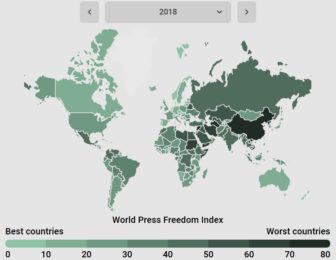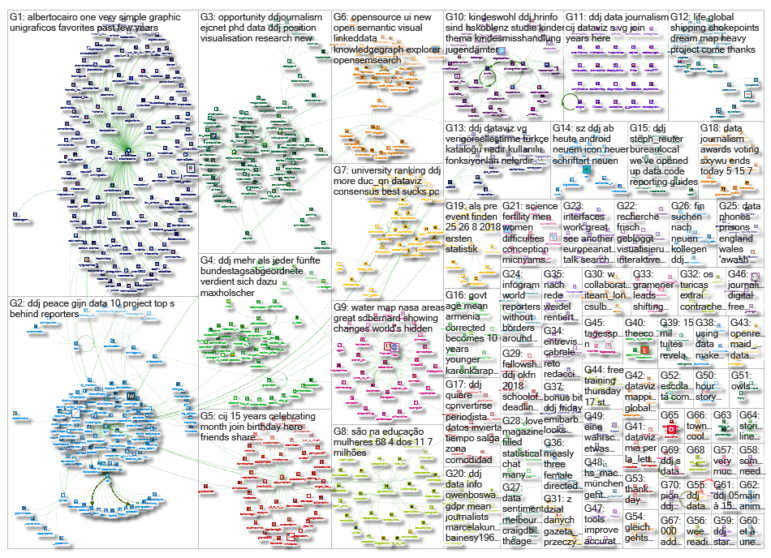 What’s the global data journalism community tweeting about this week? Our NodeXL #ddj mapping from May 14 to 20 finds @FinancialTimes highlighting @NASA data on high-risk drought areas across the globe, @infogram juxtaposing press freedom with global peace rankings, and @BBCNews showing how smuggling mobile phones is a rampant problem in English and Welsh prisons.
What’s the global data journalism community tweeting about this week? Our NodeXL #ddj mapping from May 14 to 20 finds @FinancialTimes highlighting @NASA data on high-risk drought areas across the globe, @infogram juxtaposing press freedom with global peace rankings, and @BBCNews showing how smuggling mobile phones is a rampant problem in English and Welsh prisons.
The Next Cape Towns
New satellite data from NASA shows that dozens of regions across the globe are in danger of running out of water due to human activity and climate.
MAP showing changes in world’s hidden fresh water. @NASA data shows new areas under risk. Great article by @FinancialTimes @lesliehook. @qgis to the rescue to produce this map on deadline.https://t.co/uCQU4jzY22#gistribe #dataviz #ddj pic.twitter.com/eSf3MQgXr1
— Steven Bernard (@sdbernard) May 17, 2018
World Peace Related to Press Freedom?
Infogram visualizes the press freedom rankings of countries in the past three years using data from the World Press Freedom Index released by Reporters Without Borders. It also juxtaposed the 10 best and worst nations against the Global Peace Index to see if there is any relation between press freedom and world peace.
We put together an #infographic comparing the top 10 best and worst countries for journalistic freedom around the world, based on data from Reporters Without Borders. https://t.co/zWcAgoa0BJ #RSFIndex #ddj pic.twitter.com/6yH5SYSXzu
— Infogram (@infogram) May 19, 2018
Prison Calling
From parliamentary replies and freedom of information requests, the BBC’s Shared Data Unit reports that at least 15,000 mobile phones or SIM cards were confiscated in English and Welsh prisons last year, equivalent to one for every six inmates. The phones are used to order drugs and coordinate criminal activity inside and outside jail.
UK prisons ‘awash’ with smuggled phones and SIM cards – BBC News https://t.co/8xczUixisE
— James Treadwell (@James_Treadwell) May 17, 2018
Germany’s Child Abuse Problem
Nationwide statistics of child abuse and maltreatment in Germany are just the tip of the iceberg. hr-INFO radio takes a deep dive into the problem of violence against children and the lack of protection for them in the country.
Two to three kids die from the aftermath of abuse – in Germany per week.
Important social issue being covered by @hrinfo https://t.co/nHqeIlZkR0
And @DasErste https://t.co/8AVCY6e3Tt
My next radio feature about a former farm deals with this topic, too.— Julia Schäfer (@featurefee) May 15, 2018
Moonlighting Politicians
German members of parliament are legally allowed to take on a secondary job. Spiegel analyzes the reported additional income of its country’s people’s representatives and found that among the top five earners are three politicians from the Christian Democratic Union of Germany who are involved in agricultural activities.
Abgeordnete sollten den Schwerpunkt ihrer Tätigkeit auf ihr Mandat legen. Das sollte erkennbar und für alle nachvollziehbar sein. Wir fordern seit langem, dass Abgeordnete ihre #Nebeneinkünfte in Euro und Cent offenlegen sollen. #Bundestag https://t.co/LUsMvLTMmv
— Britta Haßelmann (@BriHasselmann) May 18, 2018
Italian Political Parties
Coder and designer Fabio Bergamaschi mapped all the political parties in Italy’s parliament since 1949.
My latest #dataviz project [in Italian] – Govern-Map: mapping #history of #italian #political #parties which have been part of the #parliament since the #republic was born. https://t.co/BFoiV4Oyrc pic.twitter.com/DB60OZ2a8u
— Fabio Bergamaschi (@FabBergamaschi) May 17, 2018
Sex in Parliament
Giuseppe Sollazzo made a tool to chart the frequency of words and phrases uttered in UK Parliament debates, according to text extracted from the Hansard, the archive of parliamentary debates.
TIL: there’s more sex in the House of Lords than in the House of Commons
(at least in terms of mentions)#hansard #ddj #OpenDatahttps://t.co/52cimdgFbF pic.twitter.com/k8BqTNElxj— (((Giuseppe Sollazzo))) (@puntofisso) May 18, 2018
Conversations with Data Newsletter
The European Journalism Centre just launched its new data newsletter to inspire conversations with data journalists. Its first edition will focus on algorithmic reporting; take the opportunity to ask Nick Diakopoulous questions on the subject.
@ejcnet European Journalism Centre is launching a newsletter “Conversations with Data” to “inspire conversations with data journalists across Europe and beyond”, starting with @ndiakopoulos – ask him about the #algorithms beat! https://t.co/nltQLXnx8C
— Jennifer Stark, Ph.D (@_JAStark) May 22, 2018
PhD on the Brain?
Thinking of doing a PhD in digital and data journalism? There are 15 positions available listed here. Closing date of applications is this Sunday, May 27, 2018.
Thinking of doing a PhD? @ejcnet & @uva_amsterdam are offering a research position that will investigate new data analysis techniques for finding relations, groups, and patterns in multimedia data. Application deadline: 27 May. Start date: October 2018 https://t.co/uZYMmpXtsc
— European Journalism Centre (@ejcnet) May 20, 2018
Color PaletteR Package
PaletteR is an R package which lets you extract, from any image, a custom number of representative colors. It is a young package with a lot more work to be done — contributions are welcome.
How to use paletteR to automagically build palettes from pictures https://t.co/P8GqERHhNF
— The Data Journalism Den (@TheDenNews) May 19, 2018
Thanks, once again, to Marc Smith of Connected Action for gathering the links and graphing them.
 Eunice Au is GIJN’s program coordinator. Previously, she was a Malaysia correspondent for Singapore’s The Straits Times, and a journalist at the New Straits Times. She has also written for The Sun, Malaysian Today and Madam Chair.
Eunice Au is GIJN’s program coordinator. Previously, she was a Malaysia correspondent for Singapore’s The Straits Times, and a journalist at the New Straits Times. She has also written for The Sun, Malaysian Today and Madam Chair.

